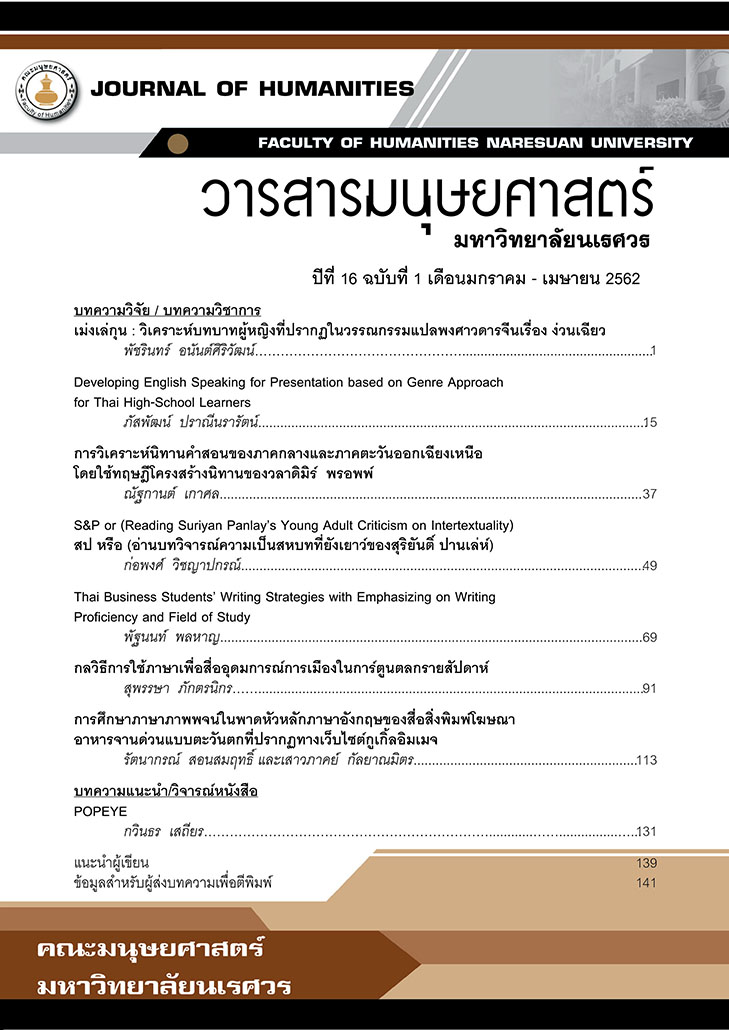การพัฒนาการพูดภาษาอังกฤษเพื่อการนําเสนอข้อมูลตามหลักการสอน แบบอรรถลักษณะสําหรับผู้เรียนไทยระดับมัธยมศึกษาตอนปลาย
Main Article Content
บทคัดย่อ
ปัญหาบทเรียนภาษาอังกฤษในประเทศไทยยังคงเป็นปัญหาสืบเนื่องมาจนถึงปัจจุบัน ทั้งนี้ บทเรียนภาษาอังกฤษจำนวนมากยังไม่ค่อยมีประสิทธิภาพในแง่ของการช่วยให้ผู้เรียนระดับเยาวชน ยกระดับความรู้ ความเข้าใจด้านภาษาศาสตร์ซึ่งเป็นส่วนสำคัญที่จะช่วยให้ผู้เรียนสื่อสารได้อย่างมีประสิทธิภาพ ผู้เรียนจำนวนมากไม่สามารถนำความรู้ด้านภาษาศาสตร์ มาใช้สื่อสารในสถานการณ์จริงได้ งานวิจัยฉบับนี้จึงมีวัตถุประสงค์เพื่อพัฒนาบทเรียนภาษาอังกฤษตามหลักการสอนตามแบบอรรถลักษณะ (Derewianka 1990) ซึ่งมุ่งเน้นวัตถุประสงค์ของการสื่อสาร การจัดเรียงข้อมูล และองค์ประกอบทางภาษาศาสตร์กลุ่มตัวอย่างนักเรียน ได้แก่นักเรียนระดับมัธยมของโรงเรียนสตรีวิทยา เครื่องมือที่ใช้ในวิจัยฉบับนี้ ประกอบด้วย 1.) บทเรียนสำหรับฝึกการพูดตามหลักการสอนแบบแบบอรรถลักษณะ จำนวน 2 บทเรียน ซึ่งเป็นการฝึกนำเสนอข้อมูลตามความเป็นจริง (อรรถลักษณะแบบรายงาน) 2.) อุปกรณ์บันทึกวิดิทัศน์เพื่อบันทึกข้อมูล ผลลัพธ์ของการวิจัยนี้ชี้ให้เห็นถึงประเด็นต่างๆ ที่จะเป็นประโยชน์ต่อการพัฒนาบทเรียนและการเรียนการสอนสำหรับการฝึกพูด แก่ผู้เรียนไทยระดับเยาวชนในฐานะผู้เรียนภาษาอังกฤษเป็นภาษาต่างประเทศ
Article Details
ข้อความรู้ใด ๆ ตลอดจนข้อคิดเห็นใด ๆ เป็นของผู้เขียนแต่ละท่านโดยเฉพาะ คณะมนุษยศาสตร์ มหาวิทยาลัยนเรศวร และกองบรรณาธิการวารสารมนุษยศาสตร์ฯ ไม่จำเป็นต้องเห็นพ้องด้วย
เอกสารอ้างอิง
Berendt, E. A. (2009). For Communication and Learning: Research in Spoken and Applied Discourse. Bangkok: Assumption University Press.
Bolton, K. (2008). English in Asia, Asian Englishes, and the Issue of Proficiency. English Today, 94, 24(2), 3-12.
Cheng, A. (2007). Transferring Generic Features and Recontextualizing Genre Awareness: Understanding Writing Performance in the ESP Genre-Based Literacy Framework. English for Specific Purposes, 26(3), 287-307.
Conlon, S. (2009). Chaos in the Classroom. Bangkok: Assumption University Press.
Derewianka, B. (1990). Exploring How Texts Work. NSW: Primary English Teaching Association.
Derewianka, B. and Jones, P. (2012). Teaching Language in Context. Melbourne: Oxford University Press.
Foley, J. A. (2011). Grammar Meaning and Discourse. Bangkok: Assumption University Press.
Gardner, S. and Nesi, H. (2013). A Classification of Genre Families in University Student Writing. Applied Linguistics, 34(1), 25-52.
Johns, A. M. (2003). Genre and ESL/EFL Composition Instruction. In B. Kroll (ed.). Exploring the Dynamics of Second Language Writing. Cambridge: Cambridge University Press. 195-217.
Lewis, M. and McCook, F. (2002). Cultures of Teaching: Voices from Vietnam. ELT Journal, 56(2), 146-153.
Myskow, G. and Gordon, K. (2010). A Focus on Purpose: Using a Genre Approach in an EFL Writing Class. ELT Journal, 64(3), 283-292.
Paran, A. (2012). Language Skills: Questions for Teaching and Learning. ELT Journal. 66(4), 450-458.
Sutinwong, N. (2015). An Analysis of Genre Writing of Thai Adolescent learners found in the Writing of Genre of Recount and Information Reports. Unpublished Master’s Thesis, Assumption University, Bangkok, Thailand.
Thu, A. M. (2009). The Effects of Using a Genre-Based Approach in Teaching English Writing Skills: A Small-Scale Study on Undergraduate Students in Myanmar. Unpublished Master’s Thesis, Assumption University, Bangkok, Thailand.
Tudor, I. (1996). Learner-Centredness as Language Education. Cambridge: Cambridge University Press.


